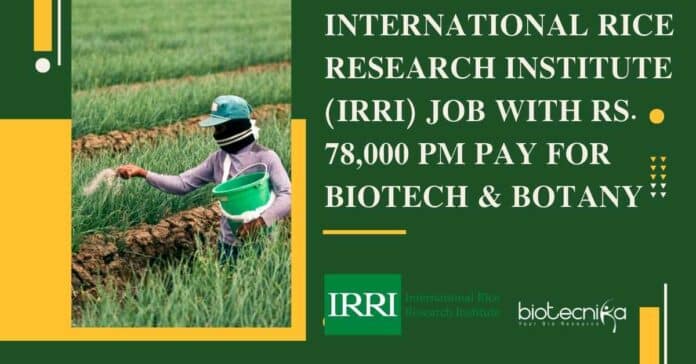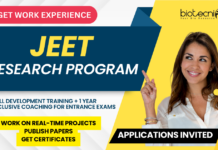International Rice Research Institute (IRRI) Job With Rs. 78,000 pm Pay For Biotech & Botany
International Rice Research Institute (IRRI) Job With Rs. 78,000 pm Pay For Biotech & Botany. MSc, PhD Biotech & Botany candidates can apply for Project Scientist III – Molecular Pathology at IRRI. Interested and eligible applicants can check out all of the details on the same below
This job expires in
Project Scientist III – Molecular Pathology
Job ID: HQ01588
Location: India
Closing Date: 28-Aug-2023
Salary: 78000 – 78000 INR per month
About IRRI
The International Rice Research Institute (IRRI) is dedicated to reducing poverty and hunger through rice science; improving the health and welfare of rice farmers and consumers; and protecting the rice-growing environment for future generations. IRRI is an independent, nonprofit, research and educational institute, founded in 1960 by the Ford and Rockefeller foundations with support from the Philippine government. The institute, headquartered in Los Baños, Philippines, has offices in 17 rice-growing countries in Asia and Africa, and over 1,000 staff.
Working with in-country partners, IRRI develops advanced rice varieties that yield more grain and better withstand pests and disease as well as flooding, drought, and other harmful effects
of climate change.Job Purpose
International Rice Research Institute (IRRI) with the support of the Government of India, Ministry of Agriculture, and Farmers’ Welfare has established IRRI-South Asia Regional Centre (ISARC) in Varanasi, Uttar Pradesh. It is a regional facility that supports research collaboration, training, and service provision to institutions, scientists, farmers, and other stakeholders from India and other South Asian and African nations. Recently the government of India has accorded approval for ISARC phase 2 through MOU with IRRI to implement next phase activities up to 2027. It has three verticals: Centre of Excellence in Rice Value Addition (CERVA), Centre of Excellence in Sustainable Agriculture (CESA), and Centre of Education, Innovation, and Research for Development (CEIRD).
Under the guidance of the South Asia Breeding lead, IRRI is seeking applications forms for a dynamic and highly innovative Project Scientist- Molecular Pathology for coordination of activities of network project at ISARC and collaborating NAREs partners. He will lead molecular and phenotypic characterization of 3K panel, landraces and donors and molecular breeding efforts to transfer superior haplotypes in the genetic background of mega varieties. Collaborate with project partners towards introgression work and keep participating institutes as well as DBT updated on marker development and crosses attempted. He will contribute to the preparation of reports, publications, and presentations by summarizing research findings and draft manuscripts for publication in refereed journals, provide inputs to project reports, prepare posters and papers for presentation at local and international conferences and compiling projects reports.
Applicants will work in DBT-supported project at Varanasi.
Roles and Responsibilities
- Coordination of disease phenotyping, pest and disease collection and characterization.
- Trait mapping activity for pest and disease resistance.
- Coordination of pathotyping and whole genome re-sequencing and bioinformatic analysis.
- Development of haplotype specific makers to enable haplotype assisted breeding for enhancing the genetic gain model
- in order to deliver higher rates of genetic gain
- Lead the transfer of superior haplotypes through haplotype-based breeding approach in different genetic backgrounds at ISARC and IRRI-SA Hub
- Lead the genotyping of mapping populations/germplasm/segregating populations with genome-wide SNPs/haplotype specific markers for all the collaborative NARES and other centers
- Actively participate in the strategic planning and research meeting of Rice Breeding Planform and Rice Breeding SA Cluster
- Coordinate closely with the IRRI HQ team (RB Platform), IRRI-SA Hub, project partners, other NAREs collaborators, to ensure smooth flow of research activities, effective genotyping and phenotyping of germplasm.
- Engage with ISARC to help build capacity in modernizing plant pathology programs and for the effective transfer of knowledge, technology and strategy.
- Verify the progress of the research activities as defined by the agreed plans and objectives
- Supervise and mentor a team of researchers and support staff
- Represent IRRI to a wide audience by presenting at conferences/meetings
- Participate/contribute to visits, meetings, workshops, farmers’ fairs, and any such events at ISARC and outside.
- Support fund generation activities by contributing to proposal writing and creating new opportunities
- Any other tasks as assigned by ISARC Directo
Qualifications
- Doctoral Degree in Plant Pathology/Botany/Biotechnology or Master’s Degree Plant Pathology/Botany/Biotechnology from a recognized University or equivalent; and
- Seven years’ experience in Research and Development in Industrial and Academic Institutions or Science and Technology Organisations and Scientific activities and services
Skills Required
Mandatory
- Proven ability to implement plant pathology projects
- Proven ability to perform in multi-discipline and multi-cultural teams
- Excellent scientific and analytical skills
- Excellent interpersonal and organization skills
Preferred:
- Extensive experience in molecular pathology in rice
- Respectable publication record in peer-reviewed journals
Allowances:
In addition to the base salary, you will get 16% HRA
IRRI offers a highly extensive employee benefits package inclusive of globally-covered medical insurance, retirement plan, life and accident insurance and other allowances.
Possible Interview Questions:
- Can you provide an overview of your experience and expertise in plant pathology, especially in the context of rice? How have you implemented plant pathology projects in your previous roles? Answer: Certainly. I hold a Doctoral Degree in Plant Pathology and have worked extensively in both industrial and academic settings. My experience includes coordinating disease phenotyping, pest and disease collection, as well as trait mapping activities for pest and disease resistance. I have also led pathotyping, whole genome re-sequencing, and bioinformatic analysis, contributing to the development of haplotype-specific markers for enhanced breeding.
- Describe your experience in working with multi-disciplinary and multi-cultural teams. How do you manage effective collaboration within such diverse groups? Answer: Collaborating in diverse teams is an essential part of my expertise. I have successfully worked with scientists from different backgrounds and cultures, which has enriched my ability to coordinate and communicate effectively. Clear communication, respect for diverse perspectives, and fostering an inclusive work environment are key aspects of my collaboration approach.
- The role involves genotyping of mapping populations and germplasm using genome-wide SNPs and haplotype-specific markers. Can you elaborate on your experience with these techniques and their significance in rice breeding? Answer: Absolutely. I have hands-on experience in genotyping mapping populations and germplasm using genome-wide SNPs and haplotype-specific markers. These techniques are crucial for molecular breeding efforts as they allow for precise trait mapping, identification of beneficial haplotypes, and efficient selection of desired genetic traits for enhanced rice breeding and variety development.
- The job requires active participation in strategic planning and research meetings for rice breeding. Could you share an example of your contributions to strategic planning in your previous roles? Answer: Certainly. In my previous roles, I actively participated in strategic planning meetings to align research activities with organizational goals. For instance, I contributed to developing a comprehensive roadmap for incorporating haplotype-based breeding approaches in rice breeding programs, aiming to achieve higher rates of genetic gain. This involved collaborating with cross-functional teams to define objectives and milestones.
- How do you envision transferring your expertise to support capacity-building and knowledge transfer at ISARC? Can you provide an example of a successful knowledge transfer initiative you’ve been a part of? Answer: Knowledge transfer is essential for sustainable growth. At ISARC, I plan to engage with the team to modernize plant pathology programs and transfer advanced technologies and strategies. In a previous role, I successfully facilitated the adoption of a novel disease diagnostic method within a team of junior researchers, resulting in improved disease management and increased research efficiency.
Note: The answers provided are sample responses that the interviewee might give based on the information provided in the job description. Actual responses may vary based on the candidate’s experiences and expertise
Editor’s Note: Please ensure you are subscribed to the Biotecnika Times Newsletter and our YouTube channel to be notified of the latest industry news. Follow us on social media like Twitter, Telegram, Facebook







































